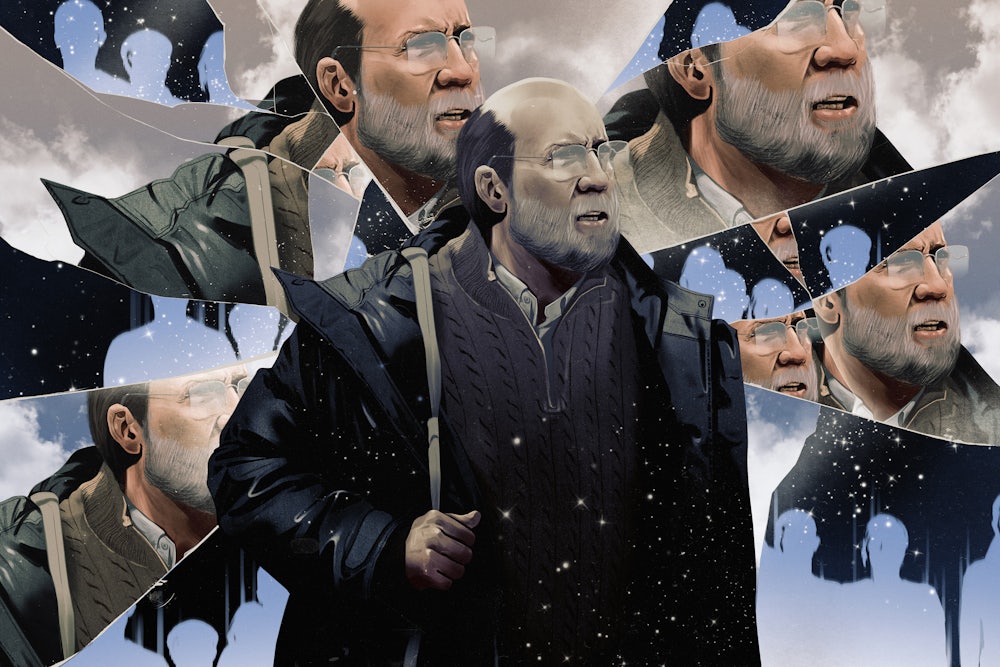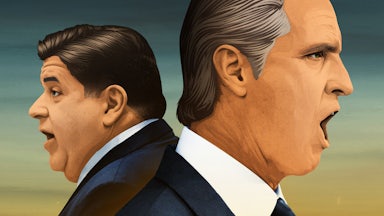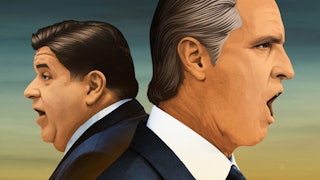When America closes its eyes at night, it sees Nicolas Cage. That’s the neo-surrealist premise of Kristoffer Borgli’s much-hyped new comedy, Dream Scenario, which gamely attempts to excavate its leading man’s enduring mystique without treading into the vanity-production territory of last year’s flop, The Unbearable Weight of Massive Talent. Whereas that faux-clever film cast Cage as an idealized version of himself—a monumentally successful Hollywood star playing a personal and professional game of chicken with self-parody—here Cage appears as a meek college biology instructor whose face is inexplicably being beamed into the dreams and nightmares of friends and strangers alike.
Not that these are star turns: When it comes to the astral plane, Cage’s character—a tenured biology professor named Paul Matthews—is a supporting player. “You’re just there,” recalls one dreamer of Paul’s nocturnal cameo. As more and more people report seeing him, the question of what he’s actually doing (or not) comes to matter less than the sheer volume of his appearances. It’s a strange but workable metaphor for viral celebrity—a state in which exposure is indivisible from importance—and a promising jumping-off point for a shivery state of the union about our anxious, addled collective unconscious.
These ideas were also present, albeit in a slightly different configuration, in Borgli’s acclaimed, Oslo-set 2022 debut, Sick of Myself, about a young couple whose mutual desire to act out in public results in a violent and increasingly abject game of one-upmanship. Like his fellow Scandinavian provocateur Ruben Östlund, who won a pair of Palmes d’Or for The Square (2017) and Triangle of Sadness (2022), Borgli is trying to draw a bead on the inherently performative nature of modern life: to examine the yearning for recognition and its consequences, especially in the unblinking gaze of a social mediascape that’s apt to bestow overbearing attention on a whim, and in the absence of anything approaching real artistic or philosophical accomplishment. The difference is that where Östlund favors broad, bombastic metaphors—like, say, a sinking luxury cruise liner becoming flooded with chunky sewage while its drunken captain quotes from The Communist Manifesto—Borgli likes to keep his meanings elusive, like fragments salvaged from the foggy depths of REM sleep.
As Dream Scenario opens, Paul is trying, in his own way, to stand up for himself: He’s negotiating with a former colleague to give him credit on a paper that he believes is actively pilfering his own years of research (something about the communal habits of ants, which indicates how deeply he’s dug into his own small, subterranean obsessions). It’s really only at the behest of his wife, Janet (Julianne Nicholson), that Paul, who’s seemingly a perfectly adequate domestic partner—and loved, if not exactly doted on, by his two teenage daughters—tries to assert himself. The unspoken implication is that Janet yearns for her husband to get his groove (or whatever he used to have) back, and yet she’s the one weirded out when he achieves a kind of omnipresence.
She is uneasy when people in their circle start reporting that they’ve been meeting Paul on the astral plane—usually as an incongruous bystander in whatever else they’re fantasizing about. All this new attention has imbued her husband with a swagger that effectively upends his nebbishy personality, turning him from a wallflower to a conversation piece, and maybe also a honeypot for female admirers drawn to his new aura (Exhibit A: a previously estranged and now quietly flirtatious ex-girlfriend).
At first, Paul handles his notoriety about as well as can be expected, modestly downplaying his role in what commentators try to frame as an anomalous psychic phenomenon. After all, it’s not like he’s appearing to people as a prophet or a guru—just a figure in a series of interior landscapes. The problems begin when he’s approached by Trent (Michael Cera), the callow CEO of an advertising firm. Trent wants him to become the front man for a series of commercials designed to be viewed with eyes wide shut—a scheme straight out of Inception for monetizing the unconscious.
At this point in his career, Cage has played pretty much every character type—and archetype—imaginable, and only rarely by disappearing into his roles: Whether he’s a romantic lead or an action hero; leaving Las Vegas or honeymooning there; a good cop or a bad lieutenant; supervillain or vampire (x2); an ambulance driver or a Ghost Rider, he’s typically conspicuous as a National Treasure, and even a little shameless in deploying an acting style he famously called “nouveau shamanism” (which is, even for seasoned admirers, increasingly indivisible from shtick). The clever trick of his performance in Dream Scenario—which, for the record, is his best in a long while—is that, for maybe the first time ever, he makes himself vague, as if melding with the drably grayscale cinematography by Benjamin Loeb (the film was shot in Toronto, standing in for an anonymous U.S. college town; the images have an achieved sort of ugliness). Bleary-eyed and balding above a steel wool beard that almost mocks his professorial vocation, Paul never quite comes into focus, even as his presence is supernaturally amplified in every direction. When Trent tries to market him as “the most interesting person in the world,” he instinctively rejects the appellation. For all his confusion over what’s happening to him—and why—he doesn’t see himself as remarkable.
Dream Scenario starts to change from gentle fable to caustic commentary when its protagonist is tempted into sharing his constituents’ awe at his personage—a shift that leads straight toward delusions of grandeur. The highlight—if it can be called that—is an extended, cringe-inducing quasi-seduction scene at the hands of a young advertising specialist (Dylan Gelula) who’s invited Paul to her apartment out of an irrepressible urge to render her dreams of him real; the sequence’s myriad and troubling subtexts about sex, power, and exploitation ripen that much more when you consider how many years a beloved A-lister like Cage has spent as somebody’s (and, more likely, a lot of people’s) obscure object of desire. Watching Paul let himself be manipulated into a flesh-and-blood-fetish doll is troubling, especially once he starts to get off on it.
It’s telling that Borgli’s producer for Dream Scenario is the enterprising horror specialist Ari Aster. His 2023 Beau Is Afraid cultivates a similar patch of thematic terrain, with Joaquin Phoenix starring as a middle-aged wreck navigating the shoals of his own paranoia; done up in shlubby, shuffling sad-sack drag, Phoenix even resembles Cage. The prevailing tone in Dream Scenario is the same lurking, ambient dread that defined Aster’s spooky breakthrough, Hereditary (2018), and Borgli isn’t above exploding the tension with a jump scare (or three, or four). This is especially true in the long middle section, after Paul’s cameos in people’s dreams start turning malevolent (possibly in sync with his newly minted narcissism). Once his role goes from resembling Where’s Waldo? to something more like A Nightmare on Elm Street—stalking, terrorizing, and even murdering folks in their sleep—he begins to experience the dark side of being a household face.
It’s here that Borgli’s script—so sure-footed in the early passages—starts to wobble, sacrificing satirical coherence on the altar of easy jokes. For instance, it’s funny when Trent tells Paul that he needs to lean into his newly sinister persona and maybe arrange a YouTube summit with Jordan Peterson, but it’s hard to say how we’re supposed to reconcile his essentially existential plight with that of a spotlight-hungry conservative ideologue, or to know whether the film is suggesting that, given a long enough timeline, every cultural hero eventually mutates into a villain—a thesis that’s no more profound for being so familiar.
Of course, cogency and absurdity don’t always have to go together: Some movies get better when they stop making sense. Still, if you compare Borgli’s project to one of its more obvious influences, Spike Jonze’s Being John Malkovich (1999), there’s an important difference in approach: One of the best things about Jonze’s film is its prodigious sense of detachment, the way it greets every one of screenwriter Charlie Kaufman’s sweaty, spiritual-slash-science-fictional convolutions with a mild, hilarious shrug. (The same calculus applies in 2002’s Adaptation, in which Cage was brilliant in a dual role as sibling screenwriters with different but ultimately complementary ideas about dramaturgy.) As a writer, Borgli has some of Kaufman’s crazed, insinuating imagination, as well as a gift for whipping up bits of physical and psychic abjection, but his direction doesn’t hold the line. There’s a fine line between balancing—or even deftly blurring—multiple tones and failing to maintain one, and the palpable drag in Dream Scenario’s homestretch suggests that its maker can’t quite get on the right side of it. The final scenes, in particular, feel misjudged, shrinking the film’s dimensions to the contours of a Saturday Night Live sketch before a final stab at melancholy that seems to belong to another—and more sentimental—movie entirely.
These flaws are real, and yet there’s still something about Dream Scenario that resonates—a feeling for our contemporary, Milkshake-ducked zeitgeist that ultimately gives its allegory about the fleeting nature of fame a bit of staying power. Having been reduced to pariah status, Paul submits to a good-faith exercise in cognitive therapy where he’s invited to stare down his students, who have expressed reservations about taking his classes; the idea is that the longer they look at him, the more they’ll come to recognize that his waking incarnation can’t hurt them.
For a couple of tense, pressurized minutes—a small eternity—Borgli cuts between Cage, exiled in deep focus to the back of the screen, and close-ups of the twentysomething kids, whose bad vibes are memorably etched by a troupe of young actors. The split-second in which the fear seems to metastasize and go viral within the school gymnasium is the moment where Dream Scenario most seems to be getting at something, however inchoate, about our deep-seated need to circle the wagons against a common enemy—and how closely those impulses are related to the ones underlying exaltation and worship.
The point of the scene seems to be that we have nothing to fear but fear itself—and also that we can always use a placeholder for those terrors. Paul has arbitrarily been a feature of both nightmares and dreams. By this logic, it stands to reason that no potential avatar for our hopes is officially more authentic than the others. In other words: We could surely do worse, as a society, and as a species, than integrating Nicolas Cage into our circadian rhythms. But could we really do much better?






